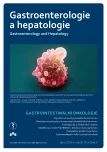-
Články
- Vzdělávání
- Časopisy
Top články
Nové číslo
- Témata
- Kongresy
- Videa
- Podcasty
Nové podcasty
Reklama- Kariéra
Doporučené pozice
Reklama- Praxe
Modified FOLFIRINOX in the treatment of pancreatic cancer – efficiency and toxicity
Authors: M. Vočka; L. Petruželka
Authors place of work: Onkologická klinika 1. LF UK a VFN v Praze
Published in the journal: Gastroent Hepatol 2016; 70(5): 413-417
Category: Gastrointestinální onkologie: původní práce
doi: https://doi.org/10.14735/amgh2016413Summary
Introduction:
Pancreatic cancer represents ~2% of all cancers (6% of all cancer deaths). The therapeutic results at all stages of the disease are worse than those of other solid tumours.Methods:
Analysis was conducted of 47 patients treated for advanced pancreatic cancer between January 2013 and July 2016 at the Department of Oncology of the First Faculty of Medicine and General University Hospital in Prague. Patients were treated with a modified FOLFIRINOX regimen with 75% reduction (oxaliplatine 85 mg/sqm, irinotecane 180 mg/sqm, leucovorine 400 mg/sqm, bolus of 5-fluorouracile 400 mg/sqm, and continual infusion of 5-fluorouracile 2,400 mg/sqm for 46 hours every two weeks) without primary prophylaxis with hematopoietic growth factors as the first line of therapy. The antitumour efficacy (number of objective responses, time to progression, and overall survival) and adverse events were monitored.Results:
The median time to progression was 6.5 months (10.1 months in patients with locally advanced disease; n = 18). The best observed response was complete remission in two cases and partial admission in 13 cases according to RECIST. Operability was achieved in four (22.2%) of 18 patients with locally advanced pancreatic cancer. The median overall survival was 17.6 months from diagnosis of inoperable locally advanced or generalized tumours.Conclusion:
In patients with advanced pancreatic cancer and a good performance status (0–1), FOLFIRINOX may significantly prolong time to progression and overall survival with good quality of life.Key words:
pancreatic cancer – FOLFIRINOX – efficiency – toxicity
The authors declare they have no potential conflicts of interest concerning drugs, products, or services used in the study.
The Editorial Board declares that the manuscript met the ICMJE „uniform requirements“ for biomedical papers.Submitted:
1. 9. 2016Accepted:
6. 10. 2016
Zdroje
1. Informační systém pro analytické zpracování dat Národního onkologického registru. [online]. Dostupné z: www.svod.cz.
2. Cowgill SM, Muscarella P. The genetics of pancreatic cancer. Am J Surg 2003; 186 (3): 279–286.
3. Hidalgo M. Pancreatic Cancer. N Engl J Med 2010; 362 (17): 1605–1617. doi: 10.1056/NEJMra0901557.
4. Verdecchia A, Francisci S, Brenner H et al. Recent cancer survival in Europe: a 2000--02 period analysis of EUROCARE-4 data. Lancet Oncol 2007; 8 (9): 784–796.
5. Glimelius B, Hoffman K, Sjödén PO et al. Chemotherapy improves survival and quality of life in advanced pancreatic and biliary cancer. Ann Oncol 1996; 7 (6): 593–600.
6. Burris IHA, Moore MJ, Andersen J et al. Improvements in survival and clinical benefit with gemcitabine as first-line therapy for patients with advanced pancreas cancer: a randomized trial. J Clin Oncol 1997; 15 (6): 2403–2413.
7. Conroy T, Desseigne F, Ychou M et al. FOLFIRINOX versus gemcitabine for metastatic pancreatic cancer. N Engl J Med 2011; 364 (19): 1817–1825. doi: 10.1056/NEJMoa 1011923.
8. Von Hoff DD, Ervin T, Arena FP et al. Increased survival in pancreaticcancer with nab-paclitaxel plus gemcitabine. N Engl J Med 2013; 369 : 1691–703. doi: 10.1056/NEJMoa1304369.
9. Gunturu KS, Yao X, Cong X et al. FOLFIRINOX for locally advanced and metastatic pancreatic cancer: single institution retrospective review of efficacy and toxicity. Med Oncol 2013; 30 (1): 361. doi: 10.1007/s12032-012-0361-2.
10. Vočka M, Petruželka L. Zařazení režimu FOLFIRINOX do algoritmu léčby metastazujícího karcinomu slinivky břišní – první zkušenosti. Gastroent Hepatol 2014; 68 (5): 436–440. doi: 10.14735/amgh2014436.
Podpořeno programem PRVOUK-P-27/LF1/1; TAČR TA04010838.
Štítky
Dětská gastroenterologie Gastroenterologie a hepatologie Chirurgie všeobecná
Článek Gastrointestinální onkologieČlánek Zpráva z odborné stážeČlánek Ursodeoxycholová kyselinaČlánek Správná odpověď na kvíz
Článek vyšel v časopiseGastroenterologie a hepatologie
Nejčtenější tento týden
2016 Číslo 5- Horní limit denní dávky vitaminu D: Jaké množství je ještě bezpečné?
- Metamizol jako analgetikum první volby: kdy, pro koho, jak a proč?
- Nejlepší kůže je zdravá kůže: 3 úrovně ochrany v moderní péči o stomii
-
Všechny články tohoto čísla
- Gastrointestinální onkologie
- Vzácná komplikace ulcerózní kolitidy
- Současné principy screeningu kolorektálního karcinomu – od oportunního k populačnímu screeningovému programu
-
Mezioborová spolupráce ve screeningu kolorektálního karcinomu
Čekací doba na kolonoskopii - „Full-thickness“ endoskopická resekce lokální reziduální neoplazie v hepatální flexuře – videokazuistika
- Dlouhodobé výsledky po radikálních resekcích pro adenokarcinom žaludku
- SOUTĚŽ O DVĚ NEJLEPŠÍ PŮVODNÍ PRÁCE 2016
- Totální pankreatektomie a její současné místo v léčbě onemocnění pankreatu
- Modifikovaný FOLFIRINOX v léčbě karcinomu pankreatu – účinnost a toxicita
- Metastazující maligní melanom do trávicího traktu bez známého primárního ložiska
- „Watermelon stomach” jako první příznak cirhózy jater
- Vzácná komplikace koloskopie – cholelitiáza s komplikacemi
- Prehepatální portální hypertenze
- Extraezofageální a gastroezofageální reflux – vztah k astma bronchiale
- 48th Annual Meeting of the European Pancreatic Club in Liverpool, 6–9th July 2016
- Zpráva z odborné stáže
- Výběr z mezinárodních časopisů
- Kreditovaný autodidaktický test: gastrointestinální onkologie
- Ursodeoxycholová kyselina
- Správná odpověď na kvíz
- Gastroenterologie a hepatologie
- Archiv čísel
- Aktuální číslo
- Informace o časopisu
Nejčtenější v tomto čísle- Modifikovaný FOLFIRINOX v léčbě karcinomu pankreatu – účinnost a toxicita
- Prehepatální portální hypertenze
- Extraezofageální a gastroezofageální reflux – vztah k astma bronchiale
- Totální pankreatektomie a její současné místo v léčbě onemocnění pankreatu
Kurzy
Zvyšte si kvalifikaci online z pohodlí domova
Autoři: prof. MUDr. Vladimír Palička, CSc., Dr.h.c., doc. MUDr. Václav Vyskočil, Ph.D., MUDr. Petr Kasalický, CSc., MUDr. Jan Rosa, Ing. Pavel Havlík, Ing. Jan Adam, Hana Hejnová, DiS., Jana Křenková
Autoři: MUDr. Irena Krčmová, CSc.
Autoři: MDDr. Eleonóra Ivančová, PhD., MHA
Autoři: prof. MUDr. Eva Kubala Havrdová, DrSc.
Všechny kurzyPřihlášení#ADS_BOTTOM_SCRIPTS#Zapomenuté hesloZadejte e-mailovou adresu, se kterou jste vytvářel(a) účet, budou Vám na ni zaslány informace k nastavení nového hesla.
- Vzdělávání



